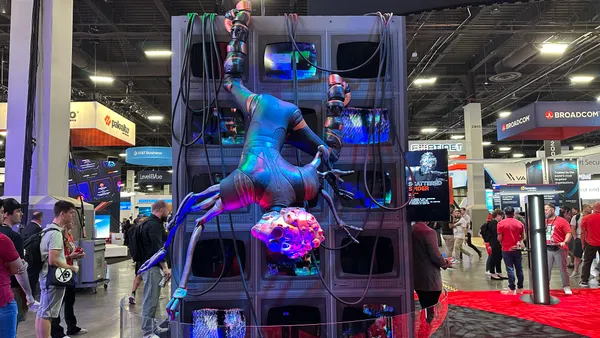Dive Brief:
- Nearly three-quarters (73%) of organizations have already integrated AI into their cybersecurity programs, but industries with critical physical safety concerns are among the least likely to have deployed it, according to a survey that the security firm Arctic Wolf released on Wednesday.
- The financial services industry led the way in implementing AI for security, with 82% of respondents in that sector saying they had done so, followed by IT and telecommunications (77%), manufacturing (77%) and professional services (75%).
- Energy companies have fewer AI deployments, with 59% of respondents saying they had incorporated AI into their cybersecurity programs, just behind government and military (60%) and transportation (64%).
Dive Insight:
Despite the growing popularity of AI-powered cyber defense solutions, industries with major physical safety concerns such as energy and transportation are hesitant to adopt the technology as widely as their counterparts in other sectors. “Disruptions can result in devastating impacts and a potential risk to human lives,” Arctic Wolf researchers wrote. “Logically then, these organizations prefer to learn from the experiences of others before trialing new technologies.”
There are geographic disparities, too. U.S. organizations were the most likely to say they had implemented AI for cyber defense (82%), while Nordic countries were the least likely (59%).
AI has demonstrated some potential to automate cybersecurity processes, and companies are eager to test those capabilities. Roughly three-quarters (73%) of respondents said they planned to use AI in their security operations centers, while 72% said they aimed to use it for threat prediction and 70% said they planned to use it to improve threat detection.
Organizations realize that AI can’t do everything and recognize the need for humans to handle many nuanced tasks. According to the report, 54% of respondents believe humans are better than AI at tracking organizations’ compliance with security rules, and a similar share favor humans over AI for adding context to threat data. On the flip side, 69% of respondents think AI is better than humans at identifying threats, and a similar share say the same about AI’s superiority in minimizing operational errors.
Even so, nearly three in 10 respondents predicted that humans would have “minimal involvement” in their security operations after the deployment of AI tools.
But that deployment will not be fast everywhere. Organizations are concerned about data privacy, cost issues and a lack of proven use cases, according to the Arctic Wolf survey. Respondents also said they lacked the technical staff to oversee AI models and didn’t yet have clear policies for managing the tools.
Regardless, in a sign that AI has consumed the cybersecurity industry and fascinated executives, very few respondents said that their leadership opposed AI deployment (16%) or that their vendors didn’t offer AI-powered solutions (14%).















